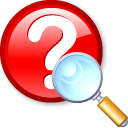| |
Library Resources
Page history
last edited
by Dana Mastroianni 12 years, 8 months ago
|

|
|
Information Literacy
You probably have heard the term Information Literacy and may have questions as to what it is and why we want our students to be information literate. Simply defined, Information Literacy is the set of skills that allow individuals to "recognize when information is needed and have the ability to locate, evaluate, and use effectively the needed information." People who are information literate can do the following:
- Determine the extent of information needed
- Access the needed information effectively and efficiently
- Evaluate information and its sources critically
- Incorporate selected information into one’s knowledge base
- Use information effectively to accomplish a specific purpose
- Understand the economic, legal, and social issues surrounding the use of information, and access and use information ethically and legally 1.
1 Association of College and Research Libraries (2000). Information Literacy Competency Standards for Higher Education . Retrieved from http://www.acrl.org/ala/mgrps/divs/acrl/standards/standards.pdf .
|
 |
|
Information Literacy Standards
Chatham University uses the standards developed by the Association of College & Research Libraries (ACRL) to inform how Information Literacy is integrated into the curriculum. In addition to the general standards developed by ACRL, there are also discipline specific standards:
|
|

|
|
Integrating IL into Classes & Assignments
The key to mastery of IL skills lies in successful integration of them into class time and assignments. Below are some examples of shorter, very practical exercises that can be completed in class and also longer assignment examples from lower and higher level courses that successfully integrate IL skills.
|
 |
|
Assessment
Without an effective way to assess what students have (or have not) learned, the time and effort devoted to crafting a great assignment is futile. Assessment does not have to be overly complicated to relay the information you need to know about students' IL skills. Below are some examples of various ways you can assess the outcomes and objectives stated in your assignments. Below are some examples of various ways you can assess the outcomes and objectives stated in your assignments.
- One option for assessing students' searching and evaluation skills is to have them keep a research log specific to the assignment. The logs are an effective way to see what resources students decide to search, how they go about doing so, and why they choose the sources they do. There are different templates for research logs,from very simple to more complex. Here are some examples of student research logs:
From Rutgers University. This log is not extremely formal in its set up, but you can clearly see the student's approach to researching this topic. http://www.libraries.rutgers.edu/rul/lib_instruct/riot/doc/research_log.pdf
Another example from Dickinson College: http://blogs.dickinson.edu/hist-304pinsker/research-journal
|
 |
|
How Librarians can Help
Librarians want to work with you to help students improve their information literacy skills. This can be accomplished through instruction sessions, individual research consultations, or through a hybrid approach utilizing face to face and online tools. Librarians can help you create assignments that will address IL skills and make the best use of the information resources that are available to students.
|
 |
|
Further Reading & Resources
|
Library Resources
|
|
Tip: To turn text into a link, highlight the text, then click on a page or file from the list above.
|
|
|
Comments (0)
You don't have permission to comment on this page.